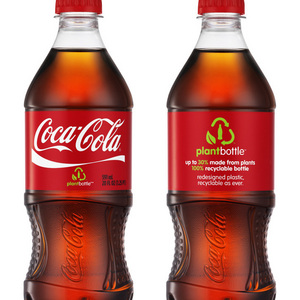Virent to scale up biobased paraxylene demonstration activities




The Coca-Cola Co.
September 9, 2014
BY Virent
Virent has announced that The Coca-Cola Co. is making an additional investment in the company’s development and commercialization of its bio-based paraxylene, BioFormPX. This investment will enable Virent to scale up separation and purification of BioFormPX material at its demonstration plant in Madison, Wisconsin.
“Over the course of our work together, Virent has continuously delivered on their commitments and advanced their technology. That progress supports building additional capability for Virent and advances us on the path to a full-scale commercial solution for our 100 percent plant-based PET plastic packaging” said Scott Vitters, general manager of the PlantBottle Innovation Platform at Coca-Cola.
Advertisement
Advertisement
Virent and Coca-Cola have been working together since 2011, when they first announced a joint development agreement and a master supply agreement focused on the development of bio-based PX technology.
“The Coca-Cola Co. continues to be a valued partner for Virent. Their intention to use our BioFormPX material in the next generation of PlantBottle packaging is critical in attracting manufacturing partners from the PET supply chain. This – along with the progress we’ve made in our joint development work – moves us closer to seeing the first commercial 100 percent bio-based PET bottles on retail shelves made using Virent technology,” said Lee Edwards, CEO of Virent.
In the course of their work with Coca-Cola, Virent has progressed their PX technology to commercial readiness, improved the process economics and produced bio-based PX which has been converted by The Coca-Cola Company into 100 percent bio-based PET bottles. This new investment will allow production of larger quantities of BioFormPX material.
Advertisement
Advertisement
Virent has run its demonstration system to fulfill a number of fuel and chemical orders since it started operation in 2010. This added capability to produce larger quantities of purified PX will be combined with additional system enhancements to increase production capabilities, including larger volumes of bio-fuel and other bio-materials.
Related Stories
The U.S. Department of Energy Bioenergy Technologies Office (BETO) announced up to $23 million in funding to support research and development (R&D) of domestic chemicals and fuels from biomass and waste resources.
The U.S. DOE has announced its intent to issue funding to support high-impact research and development (R&D) projects in two priority areas: sustainable propane and renewable chemicals and algal system cultivation and preprocessing.
Sens. Sherrod Brown, D-Ohio, and Pete Ricketts, R-Neb., in August introduced the Renewable Chemicals Act, a bill that aims to create a tax credit to support the production of biobased chemicals.
The Chemical Catalysis for Bioenergy Consortium, a consortium of the U.S. DOE’s Bioenergy Technologies Office, has launched an effort that aims to gather community input on the development of new biomass processing facilities.
USDA on March 8 celebrated the second annual National Biobased Products Day, a celebration to raise public awareness of biobased products, their benefits and their contributions to the U.S. economy and rural communities.
Upcoming Events










